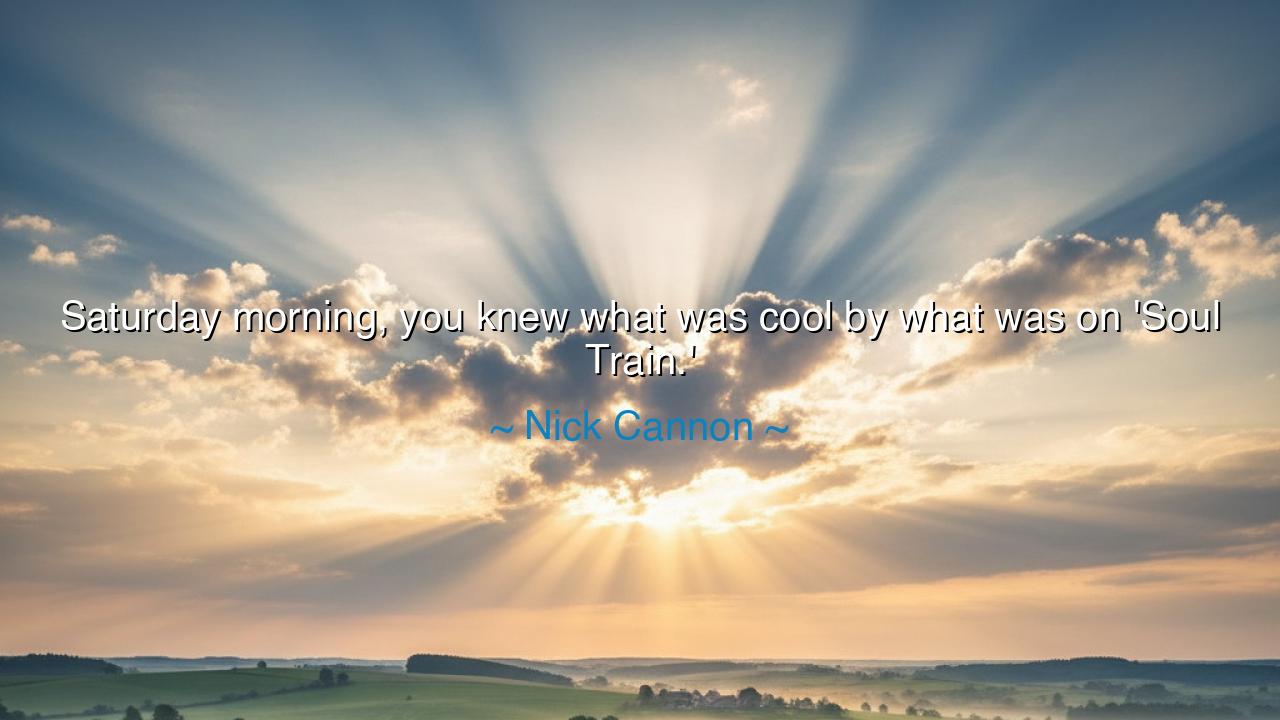
Saturday morning, you knew what was cool by what was on 'Soul






Nick Cannon’s words, "Saturday morning, you knew what was cool by what was on 'Soul Train,'" carry with them the weight of an era—a time when culture was shared, shaped, and defined by the communal experience of watching television. For those who grew up in the 1970s and beyond, Soul Train was more than just a TV show; it was a cultural compass, a window into the vibrant, ever-evolving landscape of music, fashion, and identity. Through its rhythmic beats and energetic dance moves, Soul Train became the touchstone for what was considered cool, offering a platform for Black culture to shine and influence generations across the world.
The ancients too understood the power of shared cultural symbols to shape a society’s values and what was considered worthy of admiration. In Ancient Greece, Theater was not only a form of entertainment but also a medium for defining heroism, virtue, and identity. Plays like those of Sophocles and Euripides were watched by the masses and formed the foundation of cultural ideals. Just as the people of Athens knew what was considered virtuous by the performances they witnessed, so too did the audiences of Soul Train know what was cool by the music, the fashion, and the energy of the dancers. It was not just entertainment—it was a ritual, a weekly celebration of culture and style.
Soul Train was more than a mere dance show; it was a movement, a celebration of Black identity and creativity. The dancers, the music—from Motown to funk to disco—all became the heartbeat of a generation. The show was a place where individuals from all walks of life could see who they were reflected back to them. For many, the sight of those well-dressed dancers in the soulful grooves of the latest hits was not just a form of entertainment but a visual affirmation of their cultural power and presence in the world. Soul Train gave the marginalized a seat at the cultural table, making what was cool something that could no longer be ignored.
Michael Jackson, then a young star, personified this cultural shift. When he performed on Soul Train, he didn’t just sing—he transformed the show. His moonwalk, his dazzling style, and his infectious energy made him an icon, changing the very definition of what was considered cool in the process. Jackson’s influence, first solidified on the Soul Train stage, became global, and his moves—mimicked by millions—became timeless symbols of coolness and creativity. The world wasn’t just watching music—they were watching culture in motion, a new definition of what was possible.
The lesson from Nick Cannon's reflection on the importance of Soul Train is one of collective influence. Culture, in its most powerful form, is something that evolves and defines itself through shared experiences. In our modern world, social media has become the new Soul Train, with every tweet, post, and video offering a new lens through which we define what is trendy, relevant, and cool. However, the enduring lesson is that culture is always evolving, and what is considered “cool” will shift, but the underlying principle remains: culture has the power to shape how we see ourselves and how we present ourselves to the world.
We must also consider that, much like the influence of Soul Train in its prime, coolness should be tied to authenticity rather than fleeting trends. The world we inhabit now may often look to the flashy and the superficial, but it is the genuine—the heartfelt expression of who we are—that resonates with lasting power. Whether on the dance floors of Soul Train, in the streets of Athens, or within the virtual landscapes of our own time, the lesson remains the same: find what makes you unique, celebrate it, and allow that authentic expression to shape the culture around you.
As we look to the future, let us not lose sight of the power of culture to shape our world. Embrace your place within it, be it through art, movement, or conversation, and remember that what is cool will always be defined by what is true to who we are. Just as Soul Train became a symbol of cultural pride and identity, so too can we use our own creativity and voices to set the standard for what is valued in our world. Live boldly, express authentically, and understand that the cultural movements you contribute to today will be the defining forces of tomorrow.






AAdministratorAdministrator
Welcome, honored guests. Please leave a comment, we will respond soon